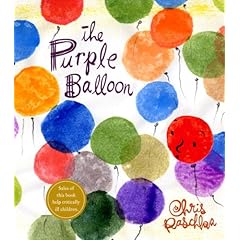 The Purple Balloon is based on odd phenomenon. It seems that often when terminally ill children who are aware of their "pending death" (as Ann Armstrong-Dailey so delicately puts it in her note before the story) are asked to draw what they feel, they draw a single blue or purple balloon floating. This sketch apparently spans cultures and religious beliefs. Researchers think it has something to do with children somehow knowing part of them will live forever. To me, this similarity is heartbreaking in its significance and prevalence. So naturally, I was expecting some deeply moving, wipe a tear from your eye, experience from The Purple Balloon. Perhaps in the end, just a single, solitary, globe sailing away into the open skies trailed sadly and haphazardly by its own string...this is not what I got. I was alarmed from the first sentence. I spent the entire story completely worried. It was not at all soothing or comforting. I mean, I don't think there's such a thing as a children's book just about dying. It's usually got some ulterior motive--generally to give the child some insight or help in dealing with the situation. I'm pretty sure that was Chris Raschka's aim too, but it felt oddly empty. I feel like he just strung opposites together to cover all his bases. Even the single sentences he accented by putting on pages by themselves just made me more scared. Now, I have to take my reaction with a grain of salt because I've never been in the situation Raschka's addressing. Maybe this is really how it goes when you're in the hospital really sick and you've left your life behind. Your friends at school, your teachers, parts of your family. Only to have them replaced by doctors and nurses, tutors. Maybe kids in these situations are meeting more people than they ever thought they would. And maybe Raschka's trying to normalize the effects or explain what all these people are for. But describing them as "making dying less hard" and "leaving easier" just seems totally presumptuous to me. Dying is never easy. Especially when you're young. And while it pains me to disagree with Desmond Tutu who gave the book a glowing review on the back cover, I think Raschka's aim was a little off with this one...or maybe I'm the one being presumptuous now?
The Purple Balloon is based on odd phenomenon. It seems that often when terminally ill children who are aware of their "pending death" (as Ann Armstrong-Dailey so delicately puts it in her note before the story) are asked to draw what they feel, they draw a single blue or purple balloon floating. This sketch apparently spans cultures and religious beliefs. Researchers think it has something to do with children somehow knowing part of them will live forever. To me, this similarity is heartbreaking in its significance and prevalence. So naturally, I was expecting some deeply moving, wipe a tear from your eye, experience from The Purple Balloon. Perhaps in the end, just a single, solitary, globe sailing away into the open skies trailed sadly and haphazardly by its own string...this is not what I got. I was alarmed from the first sentence. I spent the entire story completely worried. It was not at all soothing or comforting. I mean, I don't think there's such a thing as a children's book just about dying. It's usually got some ulterior motive--generally to give the child some insight or help in dealing with the situation. I'm pretty sure that was Chris Raschka's aim too, but it felt oddly empty. I feel like he just strung opposites together to cover all his bases. Even the single sentences he accented by putting on pages by themselves just made me more scared. Now, I have to take my reaction with a grain of salt because I've never been in the situation Raschka's addressing. Maybe this is really how it goes when you're in the hospital really sick and you've left your life behind. Your friends at school, your teachers, parts of your family. Only to have them replaced by doctors and nurses, tutors. Maybe kids in these situations are meeting more people than they ever thought they would. And maybe Raschka's trying to normalize the effects or explain what all these people are for. But describing them as "making dying less hard" and "leaving easier" just seems totally presumptuous to me. Dying is never easy. Especially when you're young. And while it pains me to disagree with Desmond Tutu who gave the book a glowing review on the back cover, I think Raschka's aim was a little off with this one...or maybe I'm the one being presumptuous now?On the bright side, sales of the book help critically ill children. And the illustrations are kind of cool. The thin color spreads he uses in the backgrounds to accent the watery balloons might mirror how transient this life, especially the lives of those facing death sooner, are...or I might have started to read way too into this book.
No comments:
Post a Comment